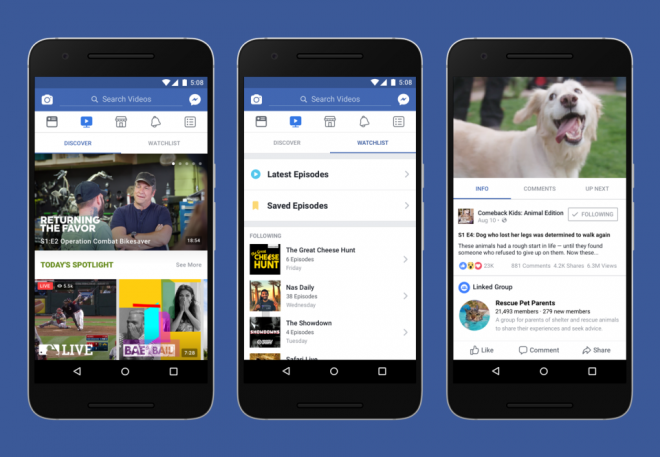
"I see video as a mega trend, same order as mobile," Facebook CEO Mark Zuckerberg had said while addressing its shareholders on an earnings call in February. This brief statement was an elucidation by the Harvard University alumnus –pointing towards a plan that has been constructed to take on Google's YouTube.
While Zuckerberg's early announcement was primarily aimed at pleasing investors, Facebook is now set to shape its future with videos by launching a platform called Watch. The latest move is a strategy by the Menlo Park-headquartered company. It is primarily to leverage the ever-growing user base of over two billion Facebook users for offering exclusive shows. Alongside merely hosting original video programmes, the social networking giant is persuading creators by pushing live engagements from its diversified users.
Facebook's Watch is an enhanced version of the Video tab that the Zuckerberg-led team had originally launched in the US last year. The new platform lists original shows with live and recorded episodes that can be accessed directly from the News Feed. Additionally, the company is providing you with a personalised touch –using its artificial intelligence (AI) powered algorithms – and has included sections like "Most Talked About," "What's Making People Laugh" and "Shows Your Friends Are Watching."
If you've started following a show on the Watch platform, it will be added to your Watchlist. This feature will send you notifications each time your faviourite content gets updated with new episodes. As a bonus, Facebook has provided a room for your valuable comments along with the ability to connect with your friends and other viewers while watching a programme live on mobile devices or a desktop.
Not a move to take on Amazon Prime Video or Netflix
Video content on the Web is not limited to YouTube, and specifically, the model of serving exclusive shows is often considered to be broadened by young entrants such as Amazon Prime Video and Netflix. However, Facebook's move with Watch is apparently to offer publishers an alternative to YouTube instead of serving a competitive model against any video-on-demand service or an entertainment company.
The significant presence of YouTube on the Web, with over 800 million unique users, has supposedly opened the new avenue for Facebook. Importantly, unlike YouTube that has been in the video hosting industry since February 2005 and is serving in-video ads through Google Adsense programme, Facebook is giving away 55 percent of its ad break revenue to Watch partners.
Funds compelling content
As Director of Product Daniel Danker explains in a statement, Facebook has even funded some shows. This advancement is mainly to "inspire creators and seed the ecosystem" at the initial stage. Mike Rowe-hosted Returning the Favor is the first community-oriented and episodic video series to receive the favour. More such funded content would join the exclusive bouquet in the coming future.
Community support
Apart from monetising content for large-scale publishers like Condé Nast Entertainment, Group Nine Media, Refinery 29 and Nasa, Facebook is giving a chance to its community to build original shows for the fresh platform. This is something where YouTube lacks. Although the Google subsidiary has a vast number of registered users, it doesn't build a community. Likewise, it is yet to have a social network-like feel for viewers. A recent YouTube app update on Android and iOS brought an ability to chat about videos, though.
"We believe it's possible to rethink a lot of experiences to rethink a lot of experiences through the lens of building community –including watching a video," highlights Zuckerberg, 33, in a Facebook post.
The success of the new platform by Facebook is yet to be determined. Nonetheless, a limited group of people in the US can access its presence at the beginning. It would also be rolled out to the masses over time.









